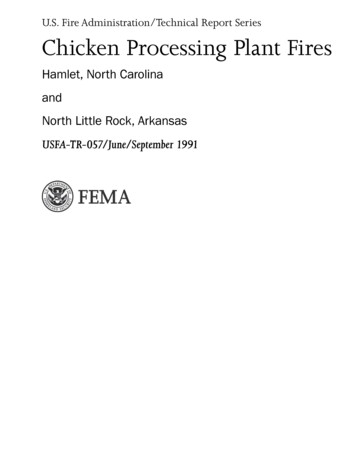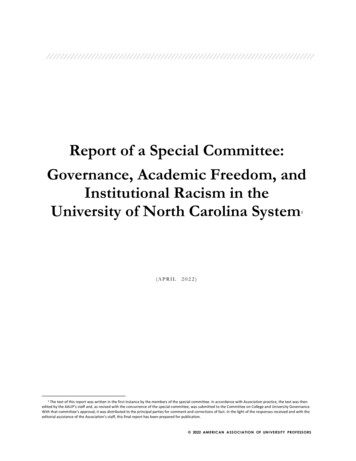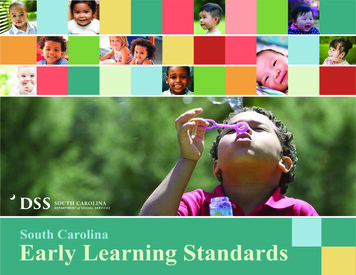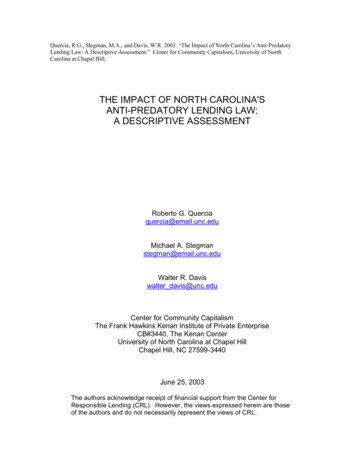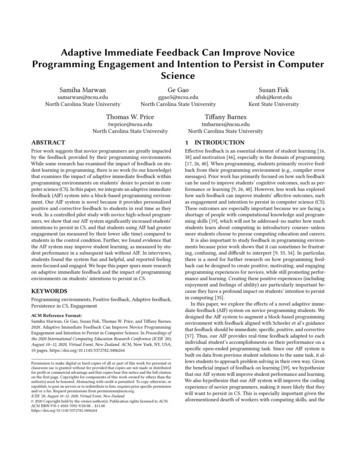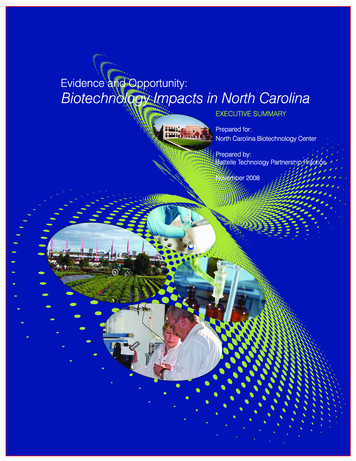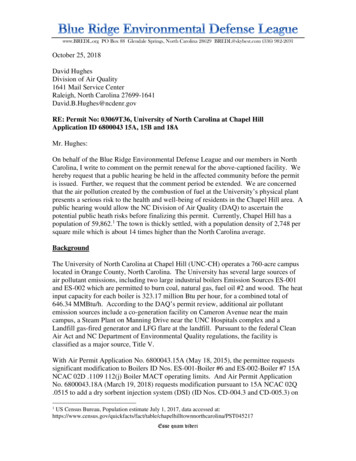
Transcription
APRIL2020Improving Serious Illness Carein North CarolinaVISITNCIOM.ORGIn partnership with the Duke Endowment, with additional support from AARPNorth Carolina, the North Carolina Health Care Facilities Association, theAssociation for Home & Hospice Care of North Carolina, and the Carolinas Center.
IMPROVING SERIOUS ILLNESS CARE IN NORTH CAROLINAThe North Carolina Institute of Medicine (NCIOM) is a nonpolitical source of analysis and advice on important health issues facing the state. TheNCIOM convenes stakeholders and other interested people from across the state to study these complex issues and develop workable solutions toimprove health care in North Carolina.The full text of this report is available online at: www.nciom.orgNorth Carolina Institute of MedicineKeystone Office Park630 Davis Drive, Suite 100919.445.6500Suggested CitationNorth Carolina Institute of Medicine. Improving Serious Illness Care in North Carolina. Morrisville, NC: North Carolina Institute of Medicine; 2020.Funded by The Duke Endowment, AARP NC, NC Healthcare Facilities Association, Association for Home and Hospice Care of NC, and the CarolinasCenter for Hospice and End of Life Care.Any opinion, finding, conclusion, or recommendations expressed in this publication are those of the Task Force and do not necessarily reflect theviews and policies of the funding organizations above.CreditsReport design and layout: Kayleigh Creech, Laser Image Printing & Marketing
TA B L E O F C O N T E N T S1IMPROVING SERIOUS ILLNESS CARE IN NORTH CAROLINA2ACKNOWLEDGEMENTS69CONCLUSION4TASK FORCE MEMBERS70APPENDIX A6EXECUTIVE SUMMARY72APPENDIX B20 CHAPTER 1Introduction and Overview26 CHAPTER 2Health System and Culture Changeto Address Serious Illness Care30 CHAPTER 3Delivery of High-Quality Personcentered Serious Illness Care43 CHAPTER 4Engagement with Individuals andFamilies to Meet Goals of Care58 CHAPTER 5Development of the Health andHuman Services Workforce andInfrastructure to Improve SeriousIllness CareMatrix of ResponsibleOrganizationsNorth Carolina Advance Directivesand Portable Medical Orders
2ACKNOWLEDGEMENTSIMPROVING SERIOUS ILLNESS CARE IN NORTH CAROLINAThe North Carolina Institute of Medicine’s (NCIOM)Task Force on Serious Illness Care was convened inApril 2019. Funding for the Task Force was providedby the Duke Endowment, with additional supportfrom AARP North Carolina, the North CarolinaHealth Care Facilities Association, the Associationfor Home & Hospice Care of North Carolina, and theCarolinas Center.at the North Carolina Community College System; Christine Carr,Chief Clinical Officer of Health Sciences South Carolina; David Cook,President and CEO of Carolina Caring; Kenneth Deans, President &CEO of Health Sciences South Carolina; Ann Elmore, Agency LegalSpecialist at the North Carolina Office of the Secretary of State; CharlieHardy, Founding Dean and Professor at the University of NorthCarolina - Wilmington College of Health and Human Services; LaurenHeeter, Quality Director at Atrium Health; Mitch Heflin, AssociateProfessor of Medicine at Duke University School of Medicine; JonathanFischer, Palliative Care Physician at Duke Hospice and PalliativeCare; Debby Futrell, President and CEO of Area L AHEC; Dawn OakeyGartman, Alzheimer’s Support Specialist / Project C.A.R.E. DirectorThe Task Force was co-chaired by Paulette Dillard, President of Shawat DAAS, DHHS; Elizabeth Golding, Medical Director of Cone HealthUniversity; Jonathan Fischer, Assistant Professor, Department ofPalliative Care Services; Jay Hemphill, Partner at Hemphill Gelder,Community Health and Family Medicine, Duke University; and JoyceP.C.; Mark Hensley, Associate State Director of Community OutreachMassey-Smith, Director of the Division of Aging and Adult Servicesand Advocacy at AARP North Carolina; Donna Lake, Clinical Associate(DAAS), North Carolina Department of Health and Human ServicesProfessor at East Carolina University College of Nursing; Kristen(DHHS). Their leadership and experience were important to theLakis, Clinical Social Worker at Duke University Hospital; Sabrena Lea,success of the work of the Task Force.Associate Director of Long Term Supports at North Carolina Medicaid,DHHS; Deborah Love, Senior Director of Bioethics, Spiritual Care, andThe NCIOM also wants to thank members of the Task Force andHumanities at Novant Health; Adrienne Mims, Vice President andsteering committee who gave freely of their time and expertise toChief Medical Officer at Alliant Health Solutions; Laura Patel, Chiefaddress this important topic. The steering committee membersMedical Officer at Transitions LifeCare; Melanie Phelps, Senior Viceprovided guidance and content, helped develop meeting agendas, andPresident and Deputy General Counsel at North Carolina Medicalidentified speakers. For the complete list of Task Force and steeringSociety; Janna Pogers, Chair of Duke Children’s Hospital Patient Familycommittee members, please see Page 4 of this report.Advisory Council; Sarah Rivenbark, Community Paramedic at NewHanover Regional Medical Center Emergency Medical Services; TimMany experts presented to the Task Force on Serious Illness Care. WeRogers, President and CEO of Association for Home & Hospice Care ofwould like to thank the following people for sharing their expertiseNorth Carolina; Cathy Sevier, State President of AARP North Carolina;and experiences with the Task Force (positions listed are as of the dateDavid Sevier, Managing Director of The Generations Study Group; Hollyof the presentation given.)Sienkiewicz, Director of the University of North Carolina-GreensboroCenter for New North Carolinians; Tish Singletary, Community HealthJohn Barkley, Chief Medical Officer of Atrium Health; Nadine Barrett,Worker Program Coordinator at the Office of Rural Health, DHHS;Assistant Professor at the Department of Community and FamilyHeather Smith, Director of Clinical Partnerships and Integration atMedicine, Duke School of Medicine; Mary Bethel, Executive DirectorAdvance Home Care; John Smith, Lead Medical Director at Blue Crossof the North Carolina Coalition on Aging; Kellie Brockman, DirectorBlue Shield of North Carolina, Lynn Spragens, Partner and Founder atof Business Development at Duke Home Care and Hospice; KarenSpragens & Gualtieri-Reed; Apollo Stevens, Director of Hospice at UNCBullock, Chair of the Department of Social Work at North CarolinaHealth Care; Sally Streans, Professor of Health Policy and ManagementState University; Jan Busby-Whitehead, Director of the Center of Agingat the University of North Carolina - Chapel Hill Gilling’s School ofand Health at the University of North Carolina School of Medicine ; KenGlobal Public Health; Pam Strader, Pastor of Congregational CareBurgess, Partner at Poyner Spruill; Christie Burris, Executive Directorand Discipleship at West Market Church; Brad Stuart, Co-founder andof the North Carolina Health Information Exchange Authority; LoriChief Executive Officer of ACI Strategies; Debbie Taylor, Director ofByrd, Associate Director of Academic Programs for Health SciencesOutreach at West Market Church; Don Taylor, Professor of Public Policy
ACKNOWLEDGEMENTS3IMPROVING SERIOUS ILLNESS CARE IN NORTH CAROLINAat the Duke University Sanford School of Public Policy; Lori Taylor,Senior Strategic Advisor Care Redesign, Blue Cross Blue Shield ofNorth Carolina; Stan Walters, Patient Advisor at the Duke UniversityHospital Patient Advisory Council; Ellie Ward, Program Coordinatorfor Outreach and Education at Vidant Health; Brian Wood, Researchand Outreach Coordinator of Mind My Health.In addition to the above individuals, the staff of the North CarolinaInstitute of Medicine contributed to the Task Force’s study and thedevelopment of this report. Adam Zolotor, MD, DrPH, President andCEO, guided the work of the Task Force. Michelle Ries, MPH, ProjectDirector, served as the Project Director of the Task Force and wasthe primary author of the final Task Force report. Erin Bennett, JD,Graduate Student Intern, Emily Hooks, MEd, Research Assistant,and Brieanne Lyda-McDonald, MSPH, Project Director, assistedwith writing and research for the final Task Force report. KaitlinPhillips, MS, edited the final Task Force report and provided socialmedia publicity for the Task Force. James Coleman, MPH, ResearchSpecialist, served as a Research Assistant for the Task Force. Keystaff support was also provided by Kisha Markham, AdministrativeAssistant, and Don Gula, Director of Administrative Operations.Former staff member, Berkeley Yorkery, MPP, Associate Director,helped to guide the work of the Task Force.
4TA S K F O R C E M E M B E R SIMPROVING SERIOUS ILLNESS CARE IN NORTH CAROLINATASK FORCE CO-CHAIRSPaulette Dillard, PhDPresidentShaw UniversityJonathan Fischer, MDAssistant ProfessorRepresentative Carla Cunningham, RNDistrict 106 (Mecklenburg)North Carolina House of RepresentativesWendee CutlerExecutive DirectorBJH Foundation for Senior ServicesDepartment of Community Healthand Family MedicineDuke UniversityLinda Darden, MHA, CPAPresident and CEOJoyce Massey-Smith, MPADirectorM. Bradley Drummond, MD, MHSAssociate Professor of MedicineDivision of Aging and Adult ServicesNorth Carolina Department of Healthand Human ServicesTASK FORCE MEMBERSTom AkinsPresident and CEOLeadingAge NCMary Bethel, M. EdExecutive DirectorNorth Carolina Coalition on AgingNathan Boucher, DrPHAssistant Research ProfessorSanford School of Public PolicyDuke UniversityVictoria Boviall, RNHealthcare integration NurseMedical Management TeamAlliance HealthChristine BrownHealthcare Marketing ConsultantBrown Healthcare AssociatesKen Burgess, JDPartnerPoyner Spruill LLPChristie BurrisExecutive DirectorNorth Carolina Health Information Exchange AuthorityNorth Carolina Department of Information TechnologySue Collier, MSNVP for Innovation and Clinical ExcellenceNC Healthcare AssociationDavid Cook, MBAPresident and CEOCarolina CaringTrellis Supportive CareDivision of Pulmonary & Critical Care MedicineUNC-Chapel Hill School of MedicineBridget Earle, MDDirector, Hospice Line ServicesAtrium HealthStacey Ellis-AntisdelPartnership CoordinatorMark HensleyNC Associate State Director of Community Outreachand AdvocacyAARP NCSheila HelmsMembership Co-ChairpersonSisters Network of Greensboro, NCLin HollowellDirector of Health CareThe Duke EndowmentJay KennedyProgram OfficerThe Duke EndowmentSue Kirkman, MDProfessor of MedicineDivision of Endocrinology and MetabolismUniversity of North Carolina at Chapel Hill School ofMedicineNC Partnership for Compassionate CareTrellis Supportive CareDonna Lake, PhD, RNClinical Associate ProfessorAnn Elmore, JDAgency Legal Specialist, Investor Protection EducationServices ProgramExecutive Committee Co-LeaderSecurities DivisionNorth Carolina Department of the Secretary of StateGlenn FieldCommunity Development Specialist IIOffice of Rural HealthNorth Carolina Department of Health and Human ServicesDebby Futrell, PharmDPresident and CEOArea L AHECCollege of NursingEast Carolina UniversityNorth Carolina Future of Nursing Action CoalitionKristen Lakis, MDiv, MSW, LCSWClinical Social WorkerDuke Pediatric Quality of LifeSabrena LeaAssociate Director, Long-term Services and SupportsDivision of Health BenefitsNorth Carolina Department of Health and Human ServicesDeborah Love, MA, JD, MBASr. Director, Bioethics and Spiritual CareElizabeth Golding, DOMedical Director of the Palliative Care ServicesNovant HealthCharles Hardy, PhDFounding Dean & ProfessorUnited Way of North CarolinaCone HealthCollege of Health and Human ServicesUniversity of North Carolina at WilmingtonRepresentative Pricey HarrisonDistrict 61 (Guilford)North Carolina House of RepresentativesMitchell Heflin, MD, MHSAssociate Professor of MedicineDuke University School of MedicineLaura MarxPresident and CEODeborah Mayer, PhD, RN, AOCN, FAANDistinguished ProfessorSchool of NursingUniversity of North Carolina at Chapel HillEleanor McConnell, PhD, RNAssociate ProfessorSchool of NursingDuke University
TA S K F O R C E M E M B E R S5IMPROVING SERIOUS ILLNESS CARE IN NORTH CAROLINASarajane MeltonRegion A AAA DirectorLarry Rocamora, JDAttorneyAdrienne Mims, MD, MPH, FAAP, AGSFFormer Vice President & Chief Medical OfficerTimothy RogersPresident and CEOSouthwestern Commission Area Agency on AgingAlliant Health SolutionsJulian Montoro-Rodriguez, PhDDirector, Gerontology ProgramUniversity of North Carolina at CharlotteChristopher Morrissette, MBAChief Operating Officer of Palliative CareFour Season and Teleios Collaborative NetworkDebi Nelson, Ma. EdBranch Head-NC Cancer Prevention and ControlDivision of Public HealthNorth Carolina Department of Health and HumanServicesSusan Nestor, MSNSr. Deputy Commissioner, Health Services GroupNorth Carolina Department of InsuranceMcPherson, Rocamora, Nicholson, Wilson & Hinkle, PLLCAssociation for Home and Hospice Care of NorthCarolinaCherie Rosemond, PhDDirectorPartnership in Aging ProgramUniversity of North Carolina at Chapel HillDavid Sevier, MSManaging DirectorThe Generations Study GroupJohn Smith, MDLead Medical DirectorFoundation for Health Leadership and InnovationMichael Parmer, DOSystem Medical Director for Post-Acute CareCarePartnersLaura Patel, MDChief Medical OfficerTransitions LifeCareJohn Perry, MD, MSExecutive DirectorWake AHECWakeMedMelanie Phelps, JDSenior Vice President & Deputy General CounselNorth Carolina Medical SocietyJanna Pogers, PT, MPT, NCS, CSRSChairDuke Children’s Hospital Patient Family AdvisoryCouncilUrsula Robinson, MHA, LCSWExecutive DirectorTriad PaceVidant HealthChristine Weason, JDNorth Carolina Government Relations DirectorAmerican Cancer Society Cancer Action NetworkPolly Welsh, MPH, RNExecutive Vice PresidentNorth Carolina Health Care Facilities AssociationRepresentative Donna White, RNDistrict 26 (Johnston)North Carolina House of RepresentativesSenator Mike WoodardDistrict 22 (Durham, Granville, Person)North Carolina SenateBlueCross BlueShield of North CarolinaLynn Spragens, MBAFounder and PartnerSpragens & Gualtieri-ReedCarla ObiolVice President of ProgramsEllie Ward, RNProgram Coordinator, Community Educationand OutreachApollo Stevens, DNP, RN, CHPCADirectorUNC HospiceKeith Stirewalt, MBA, MDivProgram Director, FaithHealth Clinical MedicineWake Forest Baptist HealthPam StraderPastor of Congregational Care & Discipleship MinistrySTEERING COMMITTEEMEMBERSSteve Freedman, MPAChief, Service OperationsDivision of Aging and Adult ServicesNC Department of Health and Human ServicesCindy Morgan, RN, MSN, CHC, CHPNFormer Vice President for Hospice, PalliativeCare & Clinical InnovationsAssociation for Home & Hospice Care NCWest Market ChurchCatherine Sevier, DrPH, RNState PresidentCharlotte Sweeney, MD, M. EdVolunteer*Titles at time of Task Force conveningPatient/Veteran and Caregiver EngagementDuke Hospital and Durham VA Medical CenterLynn TempletonExecutive Director (retired)The Center for Volunteer CaregivingBetsy VetterField Grassroots DirectorAmerican Heart AssociationStan WaltersPatient AdvisorDuke Patient and Family Advisory CouncilAARP-NC
6EXECUTIVE SUMMARYIMPROVING SERIOUS ILLNESS CARE IN NORTH CAROLINAIn spring 2019, the North Carolina Institute of Medicine, in partnershipwith agencies and organizations that provide care and advocacy aroundissues of palliative care, hospice care, aging, and long-term supports andservices, convened the Task Force on Serious Illness Care.This task force included over 60 experts across many areas relevant toserious illness care, including health care providers (physicians, nurses,pharmacists), other members of serious illness care teams (includingsocial workers and spiritual leaders), community advocates, veteransadvocates, private and public payers, legal and financial planning experts,family and community caregiver representatives, health educators,and researchers. The NCIOM and partner agencies made diversity ofexpertise, experience, and geographic region of the state a key priorityfor membership. The NCIOM task force model allowed for wide, multidisciplinary stakeholder engagement, enabled robust discussion, and ledto a comprehensive and cohesive plan to address and improve seriousillness care in North Carolina.NOTE FROM THE NORTH CAROLINA INSTITUTE OF MEDICINEApril 2020The recommendations contained in this report from the Task Force onSerious Illness Care reflect the task force process and deliberationscompleted in January 2020. In the weeks between January and thetime of this report’s publication in April 2020, the COVID-19 pandemicdeveloped across the world, including in North Carolina. The taskforce and the North Carolina Institute of Medicine acknowledge themany ways that the task force recommendations are impacted by andemphasized by the COVID-19 pandemic. In particular, we have seenhow recommendations concerning access to care (especially throughtelehealth), improving insurance coverage, supporting caregivers(including through employer-based policies), improving advancecare planning, and supporting the health care workforce, are ofdire importance in this pandemic. In addition, we also acknowledgethat the current and forthcoming economic situation of the stateand nation may impact the prioritization and implementation ofrecommendations that seek expanded funding for serious illnessservices. Fortunately, the North Carolina Serious Illness Coalition, akey recommendation from the Task Force, has already started to meetto address how to implement task force recommendations, and hasbegun to identify new and changing priorities. This Coalition will playa key role in identifying new issues for consideration as we meet thechallenges COVID-19 presents now and in the future.A steering committee contributed to developing the goals and scope ofthe task force work, selecting the meeting agendas and speakers, anddeveloping dissemination and communications strategies. JonathanFischer, MD, Assistant Professor, Duke University Department ofCommunity Health and Family Medicine; Joyce Massey-Smith, Director,Division of Aging and Adult Services, North Carolina Department of Healthand Human Services; and Paulette Dillard, PhD, President, Shaw Universitychaired the task force.The task force met 10 times in 2019 and 2020 to develop consensusbased, evidence-based, and actionable recommendations to improveserious illness care in North Carolina. The report of the task force providespolicymakers, health providers and systems, and other stakeholders witha common vision and action steps to address the impacts of serious illnesson North Carolinians.TASK FORCE ON SERIOUS ILLNESS CARE:VISION STATEMENTThrough the course of the task force work, NCIOM staff guided membersthrough the development of a vision statement that captured thescope and breadth of the areas of serious illness care prioritized forimprovement.Our vision for serious illness care in North Carolina is a system and culturethat prioritizes quality of living for people with serious illness, theirfamilies, and their communities. This system and culture will incorporatethe following elements to achieve this priority: Health system and social change to address serious illness careHigh-quality person-centered careEngagement with with patients and families to meet goals of careDevelopment of the health and human services workforce andinfrastructure to support serious illness careWHAT IS “SERIOUS ILLNESS”?Serious illness occurs when chronic or acute health conditions becomeserious enough to affect a person’s general health and functioning, andthe illness is potentially life-threatening. For individuals with seriousillness, it is possible that the effectiveness of curative treatment willdecrease, and the focus of care may shift toward comfort. Throughoutthe work of the Task Force on Serious Illness Care, the task force used theabove definition of “serious illness,” as well as the additional context thatthe task force scope was defined by individuals for whom a health careprovider would not be surprised if they were to die in the next year.SERIOUS ILLNESS IN NORTH CAROLINA:DEMOGRAPHICSAccording to U.S. Census Bureau estimates, 16.3% of North Carolinians, orabout 1.7 million people, are over the age of 65.1 The over-65 populationof North Carolina is projected to increase 67% between 2016 and 2036,from 1.6 million to 2.6 million people.2While serious illness is not solely an issue for older adults, rates are higherin this population. The 2018 Behavioral Risk Factor Surveillance Survey(BRFSS) reported that 65.8% of respondents aged 65 and over had two ormore chronic health conditionsa, and an additional 31.3% of respondentsaged 65 and over had one chronic health condition.3a Includes heart disease (heart attack/stoke/angina), current asthma, skin cancer, other cancer, COPD, arthritis, depression, kidney disease, and diabetes. Note: Not all of the reported chronic health conditions wouldnecessarily fall into the definition of serious illness used by the task force.
EXECUTIVE SUMMARY7IMPROVING SERIOUS ILLNESS CARE IN NORTH CAROLINAF IGURE 1 Leading Causes of Death in North Carolina, 2017DEATHSRATESTATE RANKUS RATE1. Cancer19,474157.121st152.52. Heart Disease18,808156.527th165.03. Accidents5,98556.320th49.44. Chronic LowerRespiratoryDiseases5,54045.323rd (tie)40.95. Stroke5,09843.010th37.66. Alzheimer’sDisease4,28937.313th31.07. Diabetes2,90323.617th21.58. Flu/Pneumonia2,07617.511th (tie)14.39. Kidney Disease2,04017.09th13.010. Suicide1,52114.335th14.0Source: CDC National Center for Health Statistics; 2017. olina/northcarolina.htmIn North Carolina, the number of individuals with serious illness isexpected to rise as the population ages. In 2009, the North Carolina StateCenter for Health Statistics projected 46,417 new cancer cases for that year(and 18,277 deaths). For 2019, the number of projected new cancer caseswas 62,466 (and 21,426 projected cancer deaths).4Rates of heart disease have also been rising. According to the BRFSS, in2012, 4.5% of adults reported being told by a health professional that theyhad angina or coronary heart disease. In 2019, 5.7% of adults reportedthis diagnosis. Among adults over 65, 15.9% reported being diagnosedwith heart disease.5While acknowledging that much of the task force’s work focused onolder adults, the task force also examined particular needs (and crosscutting needs) of younger adults and children with serious illness. In2010, the most recent year for which data is available on a survey modulefor children with special health care needs, 12.9% of respondents tothe statewide Child Health Assessment and Monitoring Program surveyanswered that their child “currently needs or uses more medical care,mental health or educational services than is usual for most children of thesame age.” In the same survey, 6.1% of respondents said that their childwas “limited or prevented in any way in his/her ability to do the thingsF IGURE 2 Projected Rates of Serious Illness, By ConditionACTUAL RATE (2018)2019-2020 PROJECTED2030 PROJECTEDAlzheimer’s DiseaseP: 170,000b persons 65 180,000 (2020)210,000 (2025)CancercI: 52,752 (2017)IR: 423.9 per 100K (NC Registry)dI: 55,394 (2016)IR: 458.4 per 100k people(age adjusted)e (CDC)Projected incidence: 62,466f(NC Registry)In 2017, the North Carolina Prevention and Control Branch:NC Comprehensive Cancer Control Program stated that theincidence rate was on the decline—decreasing 9.4% from 2009to 2014.gDiabetesP: 12.5%h (crude)2019 P: 11%Heart DiseaseHeart attack: 5.4%kAngina or CHD: 5.7%lKidney DiseaseP: 3.2%m (crude)Respiratory IllnessP: 8.1%oStrokeP: 3.8%pProjected to be rising nationwide, especially among adultsaged 65 and older.jBetween 2015 and 2030, prevalence of end stage renal disease(ESRD) is projected to rise 19-39% for adults 45-64 years old,23-75% for those aged 65-74, and 4-51% for adults over 75.nb Alzheimer’s Association, 2018. alzheimers-facts-figures-2018.pdfc This data excludes cervical carcinoma and basal and squamous cell carcinomas of the skin. North Carolina State Center for Health Statistics. https://schs.dph.ncdhhs.gov/units/ccr/d North Carolina State Center for Health Statistics 7/racegender v2.pdfe Centers for Disease Control and Prevention. United States Cancer Statistics https://gis.cdc.gov/cancer/USCS/DataViz.htmlf North Carolina State Center for Health Statistics https://schs.dph.ncdhhs.gov/schs/CCR/proj19co.pdfg NC Department of Health and Human Services. North Carolina Cancer Prevention and Control Branch. nofCancerResourceGuide.pdfh Centers for Disease Control and Prevention. BRFSS Prevalence and Trends Data, 2018.i County Health Rankings 2019j Lin J, Thompson TJ, Cheng YJ, Zhuo X, Zhang P, Gregg E, Rolka DB. (2018) Projection of the future diabetes burden in the United States through 2060. Population Health Metrics, 16(9). s/10.1186/s12963-018-0166-4k North Carolina State Center for Health Statistics k/CVDINFR4.htmll North Carolina State Center for Health Statistics k/CVDCRHD4.htmlm Centers for Disease Control and Prevention. BRFSS Prevalence and Trends Data. Kidney Disease. 2018.n McCullough KP, Morgenstern H, Saran R, Herman WH, Robinson BM. (2019). Projecting ESRD Incidence and Prevalance in the United States through 2030. J Am Soc Nephrol 30: 1-9. y/2018/12/13/ASN.2018050531.full.pdf. The prevalence of those under 45 years of age is projected to move in both directions, decreasing as much as 2% and increasing as much as 7% from its 2015 values.o North Carolina State Center for Health Statistics. 2018. k/CHCCOPD1.htmlp North Carolina State Center for Health Statistics. 2018. k/CVDSTRK3.html
8EXECUTIVE SUMMARYIMPROVING SERIOUS ILLNESS CARE IN NORTH CAROLINAmost children of the same age do.”6 In addition, in North Carolina, therewere 4,834 cases of pediatric cancer between 2003 and 2014, at a rate of162 cases per 1 million population, one of the higher rates in the country.Overall, pediatric cancer rates are highest among children aged 0-4 andteens aged 15-19, as compared to children aged 5-14.7FI GURE 3 Serious Illness Rates by Disease for Childrenand Young Adults (0-19 years of age), U.SCancer (all types)161.0-171.4 per 1,000,000(2018-2019 age-adjusted cancer incidence rates)Cystic Fibrosis25 cases per 100,000(2017 Newborn Screening)HIV/AIDS0-13 years old: 4.9 per 100,000 (2018)13-14 years old: 9.5 per 100,000 (2018)15-19 years old: 24 per 100,000 (2018)Congenital HeartDisease131 cases per 100,000 (2017 Newborn Screening)Sources: Cancer: rates-children-teens-state-region.htmCystic Fibrosis: /graphic-1.large.jpgHIV/AIDS: t 02042020.pdfCongenital Heart Disease: /graphic-1.large.jpgHEALTH SYSTEM AND CULTURE CHANGE TOSUPPORT SERIOUS ILLNESS CAREHEALTH EQUITY is the absence of avoidable or remediable differences,allowing for the attainment of optimal health for all people. Healthequity is achieved when everyone has the opportunity to attain theirfull health potential and no one is disadvantaged because of sociallydetermined circumstances. Achieving it requires focused and ongoingsocietal efforts to address avoidable inequalities, historical andcontemporary injustices, and the elimination of health and health caredisparities.Source: Racial and Ethnic Health Disparities in North Carolina: North Carolina Health Equity Report, 2019.NC Department of Health and Human Services.RECOMMENDATION 2.1:Establish coordinated statewide leadership to facilitateimplementation of recommendations and ongoing workto achieve quality of living for individuals with seriousillness (PRIORITY)The North Carolina Serious Illness Coalition should provide statewidecoordinated leadership to oversee and coordinate the implementation ofthe recommendations from the Task Force on Serious Illness Care. Underthe direction of an executive committee, the Coalition should:1.Identify and appoint appropriate stakeholders for membership inthe CoalitionThe Task Force on Serious Illness Care recognized that, with rising rates ofmany serious and chronic conditions in our state, it is crucially importantto develop a system and culture that aims to improve the quality of livingfor individuals with serious illness, their families, and their communities.The Task Force on Serious Illness Care built recommendations using theprevious and ongoing work of many experts throughout the state andnationally. In addition, the task force recognized the need for ongoingcollaboration and governance to ensure implementation of the task forcerecommendations.2.Determine statewide standards for what defines “serious illness”and how it is applied across recommendations3.Identify and support work groups charged with additionaldevelopment and implementation of specific recommendationsand to serve in an advisory capacity to additional partnersWorkgroups may include: awareness/communication, qualitymetrics/measurement, advance care planning, workforce(including wages), and policy/regulation4.Develop work plan for prioritization and implementation ofrecommendationsIn addition, the task force examined the need for broader culturaland systemic changes needed to address the challenges faced byindividuals with serious illness. Throughout the development of therecommendations, the task force was guided by principles of healthequity,
Professor at East Carolina University College of Nursing; Kristen Lakis, Clinical Social Worker at Duke University Hospital; Sabrena Lea, Associate Director of Long Term Supports at North Carolina Medicaid, DHHS; Deborah Love, Senior Director of Bioethics, Spiritual Care, and Humanities at Novant Health; Adrienne Mims, Vice President and
